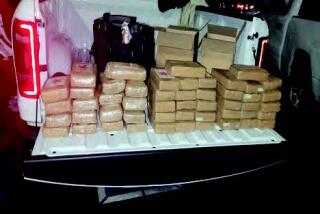JUSTICE / NEW TARGET : Big-Ticket Businesses Dealing in Drug Profits Face Scrutiny
- Share via
WASHINGTON — The U.S. war on drugs is taking aim at a new target: otherwise legitimate businesses that accept illicit spoils as payment, and in effect launder drug money.
Drug control director William J. Bennett and other officials contend that some sellers of big-ticket items, such as car dealers, yacht salesmen, jewelers and real estate operators, too often accept large cash sums for their wares, despite clear signs that the money flowed from illegal drug dealing.
“Drug dealers don’t just launder their profits through banks,” Bennett said. “They spend their cash on luxury items and real estate too. We have laws on the books requiring businesses to report cash transactions of $10,000 or more to the Internal Revenue Service. But those laws are too often being ignored.”
BACKGROUND: A recent congressional report found that some businesses routinely connive with customers to circumvent money-laundering reporting requirements.
Investigators for the House Ways and Means Oversight subcommittee called on 79 businesses in nine cities. Only one of the 79 refused when investigators--posing as shoppers--asked them to take the cash without reporting it or to accept a false name.
“Too many businesses--either deliberately or passively--are helping drug dealers disguise their profits,” Bennett said.
“There’s a moral blindness here,” said Stanley E. Morris, the Office of National Drug Control Policy’s deputy director for supply reduction. “For too many of these businessmen, the attitude is, ‘Drugs are bad, but I’m not doing drugs. I’m doing business.’ ”
CURRENT SITUATION: Bennett and Morris were commenting on charges recently brought in federal court in New York against five car dealerships, two insurance agencies and 15 individuals for allegedly laundering illegal drug profits by accepting cash for high-priced cars without reporting the transactions to the IRS.
About 31 new cars were seized in the operation code-named Operation Drug Wheels, including such models as Mercedes-Benz and Cadillac.
Criminal complaints filed by Otto G. Obermaier, U.S. attorney in Manhattan, charged that auto dealership employees, aided by insurance company agents, knowingly accepted drug profits and concealed the real identity of the purchasers and the cash.
Federal undercover agents, posing as narcotics dealers, conducted much of the probe. In each instance, the government said in court papers, the drug “dealers” spoke openly of their drug trafficking in the presence of the defendants, making clear that drugs generated the cash they were paying.
In one instance, the defendants allegedly helped to conceal the true ownership of the cars by preparing purchase agreements in the names of entertainers Ray Charles, Arsenio Hall and Eddie Murphy.
OUTLOOK: “We hope this will be the first of a series of such arrests and seizures,” Morris said. “American business has to do their share here. It’s their cities and children, too.”
“It is imperative that the business community realize that it cannot act as an aider and abettor in the money laundering schemes of the drug kingpins without subjecting itself to serious consequences,” Atty. Gen. Dick Thornburgh said.
“Federal prosecutors will pursue these drug proceeds.”
Drug law enforcers hope that cases such as the Manhattan car dealer crackdown will have a chastening impact similar to that felt by the banking industry after the 1985 move against the Bank of Boston for knowingly failing to report more than $1.2 billion in cash transactions.
The bank’s primary unit, First National Bank of Boston, was fined the maximum of $500,000.
Banks’ reports to the IRS then shot up from fewer than 600,000 annually to 3.5 million in 1986, and double that number last year.
More to Read
Sign up for Essential California
The most important California stories and recommendations in your inbox every morning.
You may occasionally receive promotional content from the Los Angeles Times.













